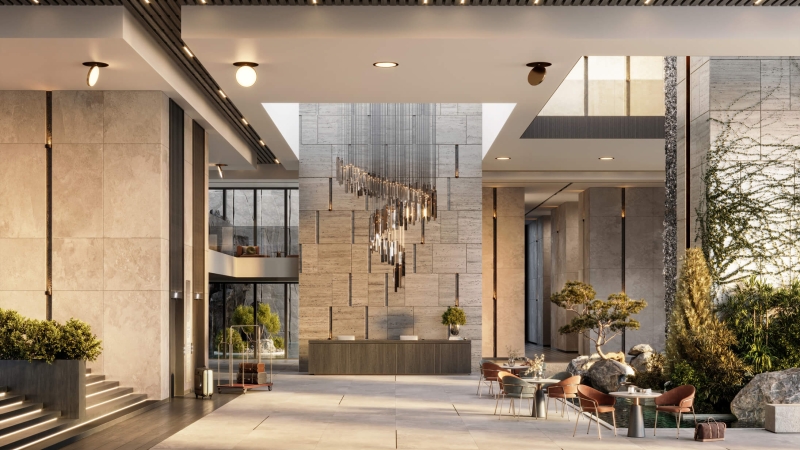Hotels, like all other businesses, are subject to the whims of the economy, industry, and changes in the local markets. Hospitality and travel trends are constantly shifting, causing hoteliers to adopt new business and marketing strategies constantly. While keeping up with industry trends is integral to staying relevant and competitive, offering a worthwhile and reliable product is the foundation of success. The capabilities properties have to offer—their hotel facilities and amenities—can make or break them, regardless of changes in the market or industry trends.
In this guide, we’ll cover the ins and outs of hotel facilities as we review the impact they can have on property sales, marketing efforts, and more. You’ll uncover tips, tools, resources, and facility-focused strategies you can use to attract more business and drive hotel revenue. If you’re looking for ways to improve MICE offers, promote meeting space, or improve the guest experience, you’ve come to the right place.
What are hotel facilities?
A broad and sweeping term, “facilities,” can technically refer to any part of a building or hotel, from the actual structure to the parking lot or guestrooms. However, in this guide, our discussion is more specific; we’re talking about more than the building itself or individual guestrooms. Hotel facilities are designated spaces and utilities designed to facilitate activities. These spaces include, but are not limited to:
- The lobby
- Check-in/check-out areas
- Food and dining spaces/services
- Hotel bar
- Fitness facilities
- Onsite spa
- Business centre
- Meeting rooms
- Swimming pool
- Tennis courts
- Guest lounges
- Outdoor patio
Although “amenities” and ‘facilities” are frequently used synonymously, hotel facilities are distinct spaces and should be categorised separately. Think of it this way: facilities facilitate activities, and amenities improve them. For example, a guestroom can accommodate sleep, relaxation, dining, work, and more. Amenities that will wow your guests and enhance the quality of those activities might include blackout curtains, high-end toiletry products, a separate dining table, or a flexible workstation.
What is hotel facilities management?
Hotel facilities management is a component of hotel operations management focused on the maintenance and upkeep of hotel spaces. Facilities managers determine which facilities a hotel will offer and how they will operate. They work with other departments to ensure all hotel facilities run safely, sustainably, and efficiently.
Optimising facility performance and perception may require implementing eco-friendly hotel solutions, instituting new technology and software, developing new operating procedures, or hosting staff training. As sustainability initiatives, guest wellness, and forms of hotel technology continue to dominate industry trends, these factors have become essential to hotel facilities management.
The importance of maintaining hotel facilities
Facilities and amenities make your hotel unique, helping to set it apart from the competition. Guests may review multiple properties when seeking accommodation, looking at online reviews, photos, and written descriptions. If your facilities appeal to potential customers by meeting their needs, they are more likely to book a room at your property than a nearby competitor.
Whether entering the lobby for the first time or coming upon your property listing online, facility presentation can significantly impact how guests perceive your hotel. Presentation and upkeep reflect the care and attention paid to hotel facilities, which consumers may view as a reflection of how well your hotel treats its guests. Attractive, clean, and safe facilities demonstrate that the staff cares for the hotel and its guests.
Optimising facility management for guest satisfaction
While effectiveness describes how successful an activity or procedure is, efficiency refers to how well something is done, and hotel facilities must have both to provide an optimal guest experience. Work with each department to ensure hotel facilities run in tip-top shape, optimising facility effectiveness, maximising efficiency, and improving hotel operations. Schedule routine maintenance to prevent major breakdowns or disruptions, manage the institution of more effective staff procedures and oversee the optimisation of each facility’s operational output.
Guests shouldn’t have to worry about whether their favorite gym equipment is out of order or if the dining room will be too crowded while they try to squeeze in a quick breakfast. Travellers should be able to rely on their hotel to provide all services and experiences as advertised, making their lives easier instead of more complicated.
Ten tips for improving and promoting hotel facilities
Whether you’re seeking property improvement advice, new marketing strategies, or ideas for using hotel facilities to capture more business, you’ll benefit from these tips.
1. Update hotel images
Schedule a photoshoot to capture high-quality, up-to-date images of hotel facilities. Update property photos on all hotel listings and booking sources, such as the main website, social media pages, your Google Business listing, and Cvent venue profile.
2. Provide additional guest benefits with packages and promotions
Create special packages and promotional offers that incorporate the usage of hotel facilities. Combine guestroom and event space rental to build attractive packages that appeal to many different types of hotel guests. Access to event space for three or four hours could benefit a large family with small children as much as a corporate traveller seeking a private room for a teleconference.
Get creative with facility-based packages. Consider opening portions of the hotel patio or dining room to private reservations for parties and intimate gatherings. Create spa, fitness, and meal packages, and capture new local accounts by offering complimentary room nights for every two or three meetings booked. Promote packages and special offers during the online booking process to boost website conversions and maximise revenue potential.
3. Enhance your MICE offers
Grow MICE business with facility-based promotions and offers. Look for unique ways to utilise hotel spaces to improve the MICE stay experience. Consider using hotel facilities to offer perks like:
- Private dining space
- Meeting space
- Early fitness centre access
- A lobby welcome table
- VIP parking or shuttle service
- Personalised decorations
- Early check-in/late check-out exclusives
- Comp promotions (i.e., one complimentary room per 20 booked)
Design exclusive all-inclusive MICE packages that include comfortable rooms, meeting space, or use of other hotel facilities. Give planners access software that gives groups the power to manage their rooming list. A tools put planners and MICE contacts in control of their block, freeing up hotel staff to spend more time satisfying guests.
4. Open meeting facilities up to instant bookings
Allow travel and event planners to book simple meetings at your property instantly. Online booking eliminates the need to undergo the RFP process for smaller events. Using pre-set contract terms and conditions, you can streamline event management. Make contracting simple meetings a breeze, and free up the hotel sales team to focus on bigger pieces of business.
5. Cultivate a distinguishable brand identity
A brand identity represents what your hotel is all about: its atmosphere, offerings, and values. Build an identifiable brand that establishes what guests can expect from your property, with a brand identity that makes it easy for consumers to distinguish the hotel’s marketing. Consider the following:
- Is your hotel designed to accommodate budget-conscious or luxury travellers?
- Do you cater to vacationers, corporate guests, or multiple market segments?
- What types of hotel guests do you want to attract?
- Which travellers find the hotel’s facilities most appealing?
- What colour scheme, font, and logo capture the hotel’s spirit?
When building your brand, consider the hotel’s facilities and services your property can offer. If your hotel doesn’t have a meeting room or business centre, it could be misleading to market the property as the best choice for business travellers or digital nomads. Instead, consider creating a leisure-focused brand by pinpointing what your hotel does have to offer, such as a welcoming lobby and comfortable guestrooms.
6. Create inviting and flexible community spaces
Cultivate welcoming community spaces where guests can work, play, and relax. Look for underutilised areas in the lobby, reception area, business centre, or otherwise. Work with your team to unlock the potential of open space, turning unused hotel areas into a game corner, flexible tech-friendly workstations, or a community table. Consider your hotel’s target market, and create communal spaces that cater to your best guests.
7. Use visual storytelling to advertise facilities
While highlighting facility amenities and specific services is critical in communicating important hotel information to guests, consumers are more likely to remember an ad that tells a story than one rooted in facts. Instead of focusing on facility perks alone, create marketing that advertises the guest experience they can offer.
Invite travellers to enjoy spirited summer barbecues on the lush, comfortable outdoor patio or gather for family time in the hotel’s activity centre by creating attractive advertisements that feature the same. Use captivating images, add eye-catching colours, and write ad copy that helps the reader see, sense, and imagine what a stay at your hotel would be like.
8. Advertise hotel facilities where planners will see them
Capture more MICE, corporate, and event business by advertising your property. Capture the attention of planners actively sourcing in your area with meeting space banner ads.
9. Take marketing your facilities a step further with a virtual hotel tour
Capitalise on the virtual tourism trend by promoting a virtual tour of your hotel. Through a virtual hotel tour, customers and potential guests can tour the property, exploring the lobby and guestrooms from the comfort of their own homes. Invite prospective groups and potential clients to take the tour so they can see how well-suited the hotel is for their event. Virtual reality marketing allows future guests, travel planners, and event organisers to “try before they buy,” which can help bring them one step closer to booking.
Improve the planner experience with engaging and interactive virtual tools. With event diagramming software, planners, MICE contacts, and clients can watch their event come to life online. Interactive floorplans enable remote clients to tour event space, walk through their event setup, and view every detail in photorealistic 3D. Using event diagramming software, planners can visualise every aspect of their event—down to the finest detail—and know your property is the right hotel to meet their needs.
10. Do what you do best
Set yourself apart from competing hotels by celebrating what you do differently. Even if your property is a bit older or has fewer amenities than others nearby, you can still win consumers over with guest-focused hotel facilities and marketing that highlights them. Identify what distinguishes your property from competitors and makes it one of a kind.
Frequently asked questions about hotel facilities
1. What are eco-friendly hotel facilities?
Eco-friendly facilities promote sustainability by reducing waste, limiting energy consumption, reserving resources, and participating in other environmentally-friendly objectives. Reducing chemical usage in hotel cleaning procedures, implementing a property-wide recycling infrastructure, and installing automated smart-room technology are just a few eco-friendly initiatives that can help improve facility sustainability.
2. What are five-star hotel facilities?
Five-star hotels and luxury accommodations typically offer more services and facility variation than their brand-based or budget-friendly counterparts. In addition to luxurious rooms, five-star hotel guests may encounter one or more onsite restaurants, private swimming pools, rooftop bars, or an opulent spa.
3. How often should hotels renovate their facilities?
Around the eleven-year mark, most hotels begin to show some wear and tear. Owners and operators should be on the lookout for major renovation needs, such as replacing carpeting, fixtures, or millwork. Focus on the areas that most need updating first, especially communal areas (e.g., lobby, dining room) and revenue-driving spaces (e.g., meeting and event rooms).
When possible, schedule renovations during the off-season to minimise the negative impact on guests and hotel revenue. If finances prevent a complete renovation, revitalise your hotel with small-scale, budget-friendly renovation ideas. Work with the maintenance team to spruce up the hotel by making necessary repairs, updating furniture, or adding a coat of fresh paint. Keeping up with soft renovations can help lengthen the time between major repairs.
You’re ready to maximise the potential of your hotel’s facilities!
With all these facility facts fresh in our minds, let’s jump over to another post and look at their counterpart: hotel amenities. Join us as we explore unexpected guest amenities and discuss how offering them can help hotels exceed expectations. From event passes to activities for the kids, we look at must-have amenities to win guests’ hearts next.





